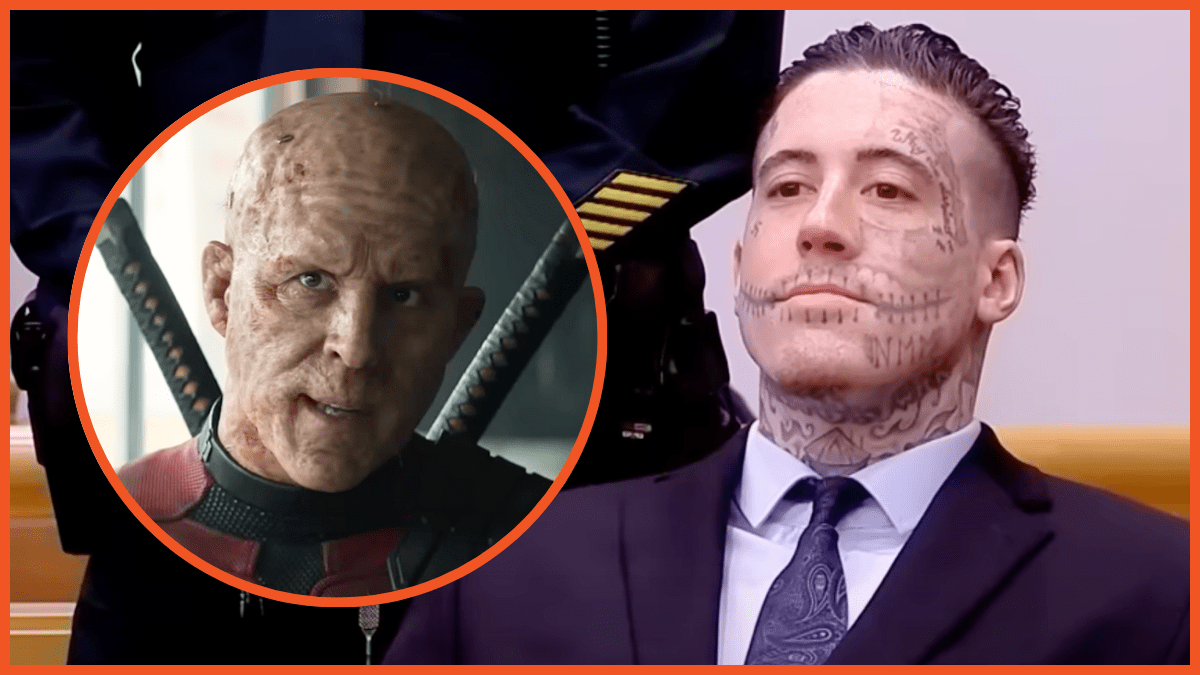The article contains graphic descriptions of intimate partner violence and murder. Please take care while reading.
In 2019, Kristine Melton met a man named Wade Wilson at a club in Fort Meyers, Florida. The next day, Wilson lured 43-year-old Diane Ruiz into the car he was driving while Ruiz was walking to work. By that point, Melton was dead. A short time later, Wilson was, too.
After a five-year wait, including pandemic-related delays, Wilson was convicted in June 2024 of Melton and Ruiz’s senseless murders. Meanwhile, Wilson shares the same name as Deadpool’s alter ego, a Marvel “anti-superhero.” For this reason, Wilson is called the “Deadpool Killer.” At the same time, Wilson’s alarming facial tattoos and flippant demeanor in court have made the Wilson case viral.
In 2019, Wade Wilson did not yet have the facial tattoos he’s known for, including a swastika, and other white supremacist imagery. Wilson reportedly tattooed his face while in custody, where he also helped plan an escape in 2020. Wilson’s legal team successfully filed a motion to let him cover the tattoos in court as they might influence the jury, but Wilson chose not to.
The jury gave Wilson the death penalty, The News-Press reported. The judge will give the final verdict on Wilson’s fate in late July.
What did Wade Wilson do to his victims?
On the last night of her life, Kristine Melton, and her friend Stephanie Sailors, were at Buddah LIVE, a bar in Fort Myers. Later that night, Melton, Sailors, and Wilson went to another man’s home in nearby Cape Coral. Finally, the trio returned to Melton’s home. Eventually, Sailors left, and Wilson strangled Melton in her sleep. He then stole her car to search for another victim. Wilson encountered Diane Ruiz walking to work, and somehow forced or convinced her to get in the vehicle. He also strangled Ruiz, but realizing she was still alive, he pushed her from the car and ran over her up to 20 times until she died.
Wilson’s ex-girlfriend speaks out
Kelly Matthews, Wilson’s ex-girlfriend, said Wilson was not violent while they were together, but when he started using cocaine, his behavior changed. Matthews ended things when Wilson physically and sexually assaulted her in the back of a car, shortly before Melton and Ruiz’s double murders. “At some point, he bit my face, bit me in the chin,” Matthews said.
Matthews escaped and reported the assault to the police, but Wilson was never arrested with no witnesses and little evidence, the detectives said. “I was just more angry that [Melton and Ruiz’s murders] could’ve been avoided if they would’ve just listened to me and put him in jail at the time,” Matthews said.
Wilson called his dad after Diane Ruiz’s murder
After killing Diane Ruiz, Wade Wilson reportedly called his father, Steven Testasecca, several times. Wilson’s biological parents were teenagers when he was born, and they put him up for adoption. Wilson reconnected with Testasecca later in life. But they were never close, The News-Press reported.
On the stand, Testasecca said Wilson was excited to tell him about the murders, and told him Ruiz was alive when he ran her over. Wilson told him, he wanted to make Ruiz “look like spaghetti,” Testasecca said in his testimony. During one of Wilson’s calls, Testasecca offered to send an Uber to pick him up if Wilson told him where he was. Wilson’s father told law enforcement the address and Wilson was arrested, instead.
Wade Wilson has requested an appeal
After Wade Wilson’s conviction, his legal team filed an appeal for a new trial, citing a change in Florida law allowing the death penalty in an 8-to-4 vote. That law passed after Ruiz and Melton’s murders, and Wilson’s legal team said the death penalty violates Wilson’s Constitutional rights, or ex post facto: imposing “criminal liability or increases criminal punishment retroactively.” As of this report, the judge had not yet ruled on Wilson’s appeal.
If you are experiencing domestic abuse, or if you believe someone you know is being abused, contact The National Domestic Violence Hotline. The hotline can be reached at 1-800-799-SAFE or spoken with online via the hotline’s website. Mobile phone owners can also text “START” to the number 88788.
